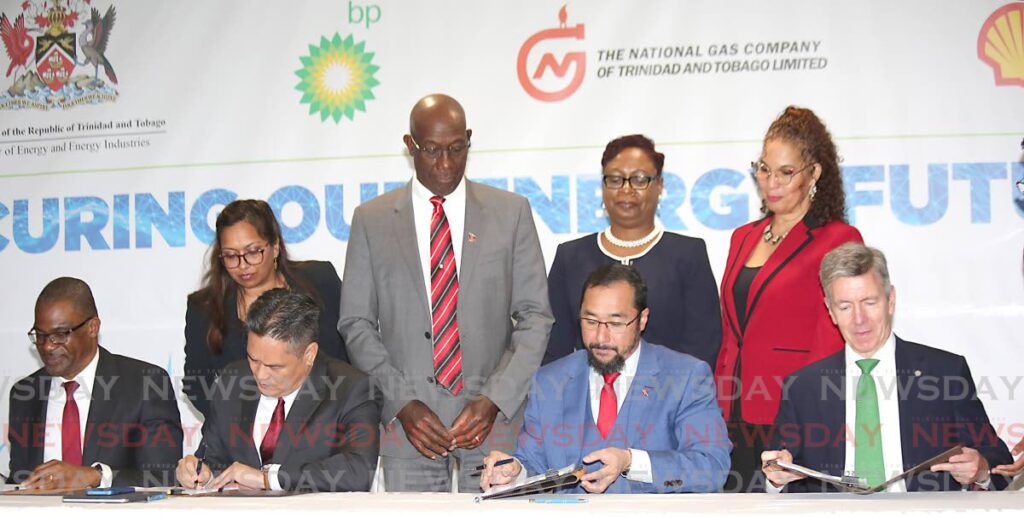Atlantic LNG to move forward on single train

The restructuring shareholders agreement for Atlantic LNG (ALNG) is expected to see the merging of all four trains as single entity at the Point Fortin facility, the National Gas Company (NGC) has disclosed to Business Day.
This will include Train 1, which has been offline since December 2020.
Business Day reached out to NGC president Mark Loquan, via WhatsApp Wednesday, after the singing of a heads of agreement with ALNG shareholders – NGC, bpTT and Shell Trinidad and the Energy Minister, Stuart Young, – at Hilton Trinidad, Port of Spain on Tuesday.
Business Day asked: “Exactly how does NGC benefit from this new restructuring?” and “What does the new arrangements mean for Train 1?”
Through its corporate communications personnel, NGC responded: “We see the ALNG restructuring as hinged to upstream development which would benefit the energy sector over the medium to long term. NGC share of ownership was 10 per cent in Train 1 and 11.1 per cent in Train 4. Once all the trains are merged into a single commercial entity, NGC would benefit from increased equity across the unitised entity.”
Business Day asked again: “Just to clarify a "unitised entity" suggests that all the trains may be merged into one... is that a fair assessment?”
NGC responded saying that it was a “fair assessment.” It added that Train 1 is still non-operational.
'Historic' restructuring of ALNG
The signing of the amended and restated heads of agreement (HoA)between the Government and shareholders in ALNG was marked as historic by stakeholders at the signing ceremony.
“After years of discussions, negotiations and dialogue we are here to sign agreements that will create a simplified commercial structure for the Atlantic LNG venture,” said Eugene Okpere, Shell Trinidad country chairman.
Pointing out that for the past three years covid19 and the Russian/Ukrainian war have brought about uncertainty and volatility in the global energy markets, Okpere said more uncertainty is expected as TT continues to find a balance between energy transition and providing clean, secure and affordable energy to meet the people’s demands.
The Prime Minister explained at the signing ceremony that discussions on ALNG’s restructuring started in 2018 with Government starting the negotiations with bpTT and ShellTT. In March 2019, shareholders signed a letter of intent affirming their willingness to discuss the restructure of ALNG. The Government and shareholders signed a heads of agreement, earlier this year, on January 25 which outlined the governing principles that would form the basis of the final agreement.
The HoA was amended and restated on Tuesday with agreed terms of the final definitive restructuring agreement. After the stakeholders settle “complex and extensive legal documents,” Dr Rowley said the final agreement would be presented by March 31, next year.
Rowley said the HOA represented the commitment of all parties involved to restructure the ALNG facility into a “unitised model” with a common ownership structure, a commercial framework for gas supply and the transitioning of the ALNG facility into a single, unitised facility.
“These negotiations are unprecedented,” Rowley said. “This has not happened anywhere in the world before.”
Loquan said NGC was satisfied with being part of the process. He explained that the discussions around the best commercial and ownership structure of the ALNG facility was a slow process, not just because of how complex the existing arrangement was but because it was imperative that the parties involved got it right.
“We needed to land on an agreement that considered the interests of all stakeholders along the natural gas value chain and although the multi-party process was arduous, complex and time-consuming, I am sure that all shareholders would agree that the eventual outcome augurs well for our shared vision for ALNG to operate at a world-class level,” Loquan said.
Aside from unitising the facility and reorganising the governance structure and shareholdings of ALNG, the restructuring agreement would also see a greater input made by the Government with regard to marketing content from ALNG.
Train 1 blues
Between 1999 and 2005 ALNG tripled its capacity with Trains 2 and 3. It then added almost double Train 1’s capacity with the construction of Train 4. The four trains’ overall capacity stands at 15 mpta (million tons per annum) of LNG.
Train 1 which started commercial operations in 1999 has a capacity of 3 mpta of LNG and 6,000 bpd (barrels per day) of natural gas liquids (NGLs). ALNG's shareholding in Train 1 is: NGC – 10 per cent, bpTT – 34 per cent, Shell TT – 46 per cent, and the Chinese Investment Corporation – 10 per cent.
Trains 2 and 3 have a capacity of 3.3 mpta of LNG and 6,000 bpd of NGLs each. The trains supply about 12,000 barrels of NGLs to Phoenix Park Gas Processors (PPGPL). Shell TT owns 57.5 per cent and bpTT 42.5 per cent.
Train 4, which was considered the largest of its kind in the world when it was constructed in 2005, has a capacity of 5.2 million tons of LNG per annum. It also has the capacity to move 12,000 barrels per day of NGLs to supply PPGPL. NGC has an 11.1 per cent ownership in Train 4, Shell – 51.1 per cent and bpTT – 37.78 per cent.
In 2020, Train 1 was shut down, faced with upstream gas supply commitments that were more than the downstream demand given possible plant shutdowns, reduced industrial activity and fears of multiple waves of covid19.
Government still invested more than $200 million to ensure that the facility was in a state of readiness and safe to operate should the supply of gas improve.
ALNG currently operates without the input of Train1, which accounted for about 20 per cent of ALNG’s capacity. According to the Energy Ministry’s consolidated monthly reports, ALNG’s production of LNG stood at 485,662,250 mmbtu for January to September 2019. For the same period in 2022, ALNG produced 310,620,369 mmbtu.


Comments
"Atlantic LNG to move forward on single train"